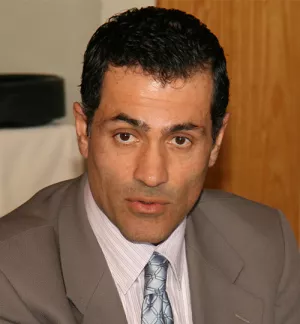On Nov. 3, Gen. Pervez Musharraf put Pakistan effectively under martial law. He suspended the Constitution; sacked judges; imposed restrictions on the press; and put hundreds of politicians, lawyers, and civil society activists in jail or under house arrest.
This was a military coup, President Musharraf's second in less than a decade. In 1999, his target was the elected government; this time it is the judiciary, the obstacle to his indefinite rule over Pakistan. Musharraf justified his actions by warning that Pakistan's sovereignty was in danger and that he would not allow the country "to commit suicide." One would assume he was referring to foreign invasion or civil war, but it was Pakistan's independent-minded judges and secular lawyers that he was accusing of sedition, for standing up to him and holding his government accountable before the law.
In the weeks leading up to martial law, suicide bombers had killed 140 people in an attack on former Prime Minister Benazir Bhutto. Seven more people died a few days later in a blast outside Musharraf's office and another eight in an attack on Air Force personnel. During the same week, Islamic extremists battled thousands of soldiers for control of Swat, a district on the Afghan border. Hundreds were killed as the military endured the humiliation of surrendering 48 soldiers to the extremists. The surging violence is a threat to Pakistan, but as Musharraf's speech made clear, it is democracy – not extremism – that worries him.
Since 9/11, Washington has embraced Musharraf as an ally in the war on terror and the bulwark against extremism in Pakistan. But Musharraf's Pakistan has not lived up to expectations. Pakistan's contribution to fighting Al Qaeda is open to question; the Taliban hiding in Pakistan are terrorizing southern Afghanistan; and in Pakistan, there is now more violence, extremism, and instability than when Musharraf took over in 1999.
What is wrong with this picture?
Washington is more concerned with Islamic extremism than Musharraf, who as military chief in 1999 sent jihadi fighters into Kashmir to challenge Indian troops. He pays lip service to democracy but views the Constitution as an impediment and elections as a threatening menace. Little wonder that while presenting a secular image to the West, Musharraf has looked to Islamic parties to upend democracy and keep former prime ministers Bhutto and Nawaz Sharif out of politics. Musharraf engineered the unexpected electoral success of Islamic parties in the 2002 elections and helped them form governments in two provinces.
As a price for their cooperation, Islamic parties got protection for their Taliban and extremist allies and a free hand to impose more Islamic laws on Pakistanis. Since 2001, Musharraf has selectively cooperated in the war on terror but resisted cutting all ties with extremists.
Extremism is not a clean weapon, and the jihadi Frankenstein that Pakistani intelligence has let loose is now threatening its master. Musharraf has been the target of assassinations, and last summer troops had to be deployed in Islamabad to dislodge violent extremists from the Red Mosque, popular with Pakistani officers and less than a mile away from the headquarters of Pakistan's Inter-Services Intelligence.
Things turned for the worse last spring when Musharraf tried to end the independence of the judiciary by firing the uncooperative head of the Supreme Court. Thousands of lawyers and secular pro-democracy activists poured into the streets to defend the Constitution. The game was up; fear of extremism was no longer enough to stop the call for democracy.
Hoping to provide a smooth transition to civilian rule, Washington brokered a deal between Musharraf and Bhutto. Before the ink was dry, Musharraf let it be known that he would take off his uniform only after he was reelected. But the Supreme Court frustrated Musharraf's plans, hinting that it would not approve his reelection while he was still head of the military.
It was to prevent the Supreme Court from issuing its damning verdict that Musharraf put Pakistan under martial law. Pakistanis see through Musharraf's ruse and will gather in opposition.
An isolated Musharraf will look to his military to keep him in power. Soldiers fighting Islamic extremists, plus an insurgency in Baluchistan and a war with Al Qaeda and Pashtun tribesmen, will now also face angry throngs in their own streets. This will not benefit the war on terror nor is it a mission the military covets. In the past, Pakistan's military has overthrown governments that have sent soldiers to fight crowds. In 1969, the military removed Gen. Ayub Khan once antigovernment opposition reached a crescendo. His successor, Gen. Yahya Khan, quickly promised – and eventually implemented – free and fair elections and return to civilian rule. Almost a decade later, General Zia ul-Haq overthrew Prime Minister Zulfiqar Ali Bhutto before he could order the Army to suppress anti-government protesters.
Musharraf's interests are no longer those of his military, and the two are now on a collision course. Generals can still end this crisis by going back to the deal Washington brokered with Ms. Bhutto, but only if it does not include Musharraf. Removing Musharraf will send demonstrators home and the Army to its barracks.
The longer Musharraf stays in power the more Pakistan will look like Iran in 1979: an isolated and unpopular ruler hanging on to power only to inflame passions and bring together his Islamic and pro-democracy opposition into a dangerous alliance.
A disastrous outcome in Pakistan, a nuclear-armed state with weak institutions and rife with extremist ideologies, violence, and deep ethnic and social divisions, will be far worse than what followed the Iranian revolution.
The West cannot afford to let this political crisis spiral out of control. Western leaders must keep the pressure on Musharraf, reach out to the Pakistani Army, and seriously plan for a post-Musharraf Pakistan.
Nasr, Vali. “Musharraf fears democracy, not extremism.” Christian Science Monitor, November 5, 2007


